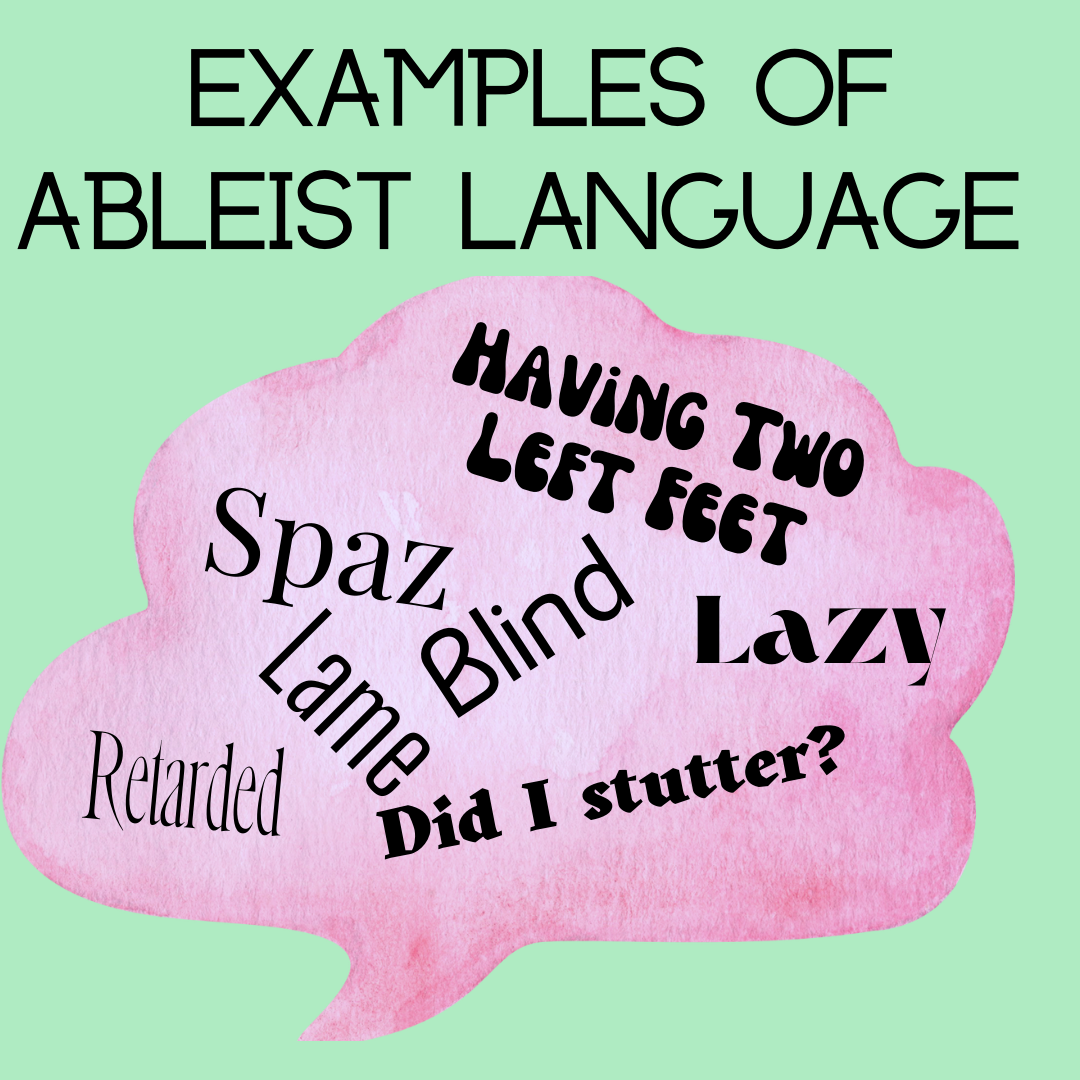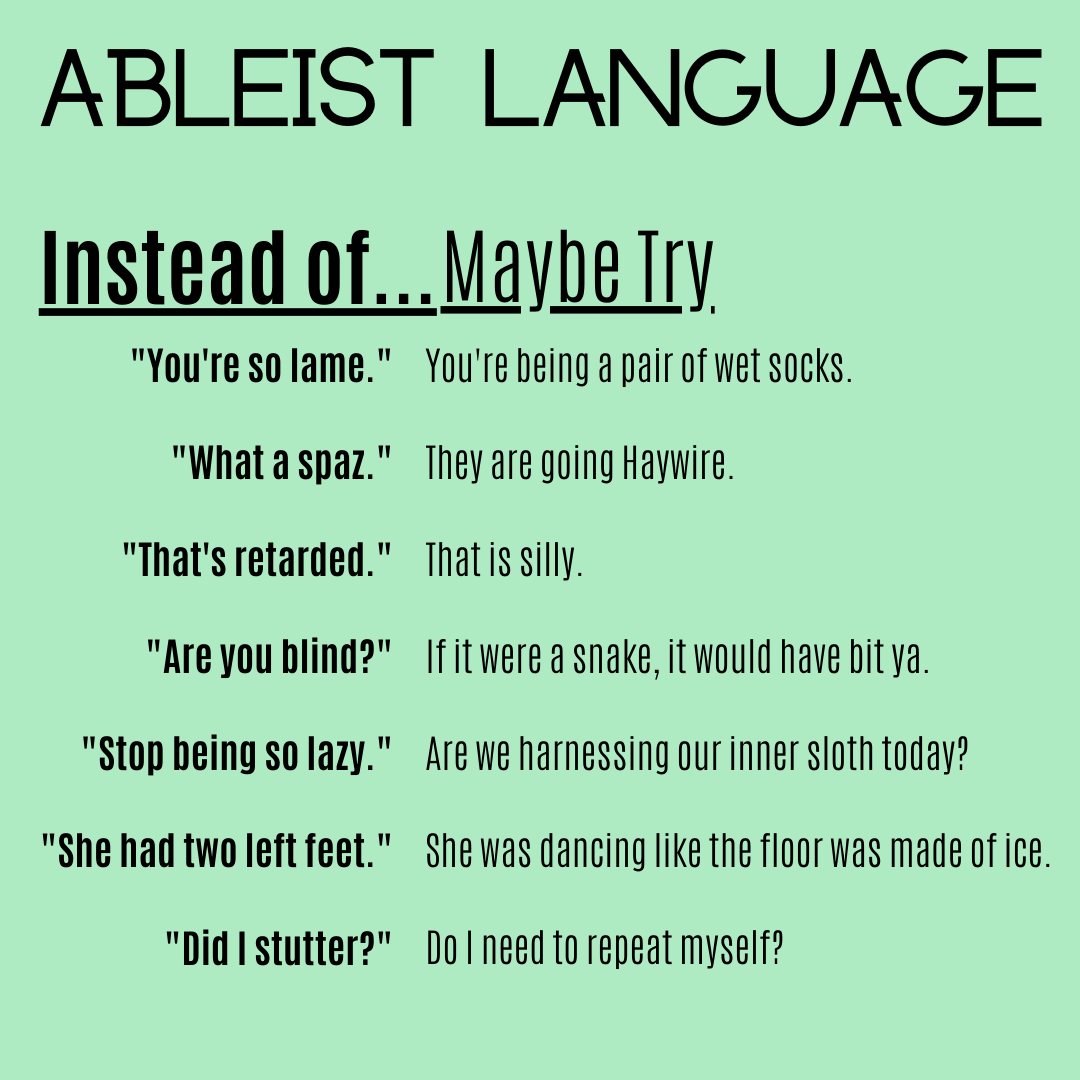What is ableist language and why does it hurt people?
“Stop being such a spaz!” “That’s so lame.” “You’re just being lazy.”
Many of us have heard these phrases or something similar and didn’t realize that they were causing harm. Damaging and ableist language like this has become commonplace in our society and the first step to eliminating it is raising our own (and hopefully others’) awareness of WHY these types of words and phrases are inappropriate even if “everyone is saying it”.
Okay, so what does it mean for something to be ableist?
Ableism (according to the Oxford English Dictionary) is discrimination in favor of able-bodied people. Basically, it’s language, ideas, and policies that don’t create a safe space for folks that aren’t considered able-bodied. As a society, we may not be as aware of ableism as we are of racism, antisemitism, or sexism (as just a few examples), but it makes it no less harmful to those in our families, social circles, or communities. Plus, it’s worth considering that no individual is immune from becoming a member of the disability community. From genetics to accidents, there are millions of ways any one of us could become disabled.

I’m not ableist, and I don’t use ableist language!
That’s the hope, but it may not be the reality. Many (if not all) of us have used non-inclusive language. Below are some examples we received in the comments of our social media post.
- Lame
- Spaz
- Retarded
- Blindspot
- ”Are you blind?!”
- Lazy
- Two Left Feet
- “Did I stutter?”
One of our friends said, “I hear a lot of ‘lame’ still. Also when someone can’t find something I often hear them say ‘I must be blind!’ or ‘I was paralyzed!’ when someone didn’t know what to do in a situation or was scared or something.” Another example is the medical term “lame” which refers to not being ambulatory or moving slowly and with difficulty, but it has become synonymous with “uncool” or “boring”.
This just showed how common this language is around us. This language is harmful because people internalize the negative connotations and relate them to themselves. And most people don’t mean to be harmful or offensive. Humans often go into autopilot and say things without realizing the impact the words may have on others.
But I hear this language every day.
We all do! In fact, recently musical artist, Lizzo, gained attention for using “spaz” in one of her songs. This word, originally used as a slur for folks with Cerebral Palsy, is often used as slang for losing physical or emotional control. Fans drew attention to this language and Lizzo chose to re-record the song with a new lyric, which is the hope for each of us. If we all become more aware and open to changing our language, we can make leaps and bounds to eliminating ableist language from our society. Examples of words you can use instead of spaz include fumbling, stumbling, having an outburst or frenzy, or going haywire. Remember that progress isn’t immediate and it takes practice to eliminate harmful language from your vocabulary.
What should I do next?
- Educate yourself! Follow up with the articles at the end of this post. Take advantage of Google or your social media community. (Please be respectful of your disabled friends – they do not owe you an education, and compensation for emotional labor is always appreciated)
- Listen! When someone tells you a word is harmful or offensive- believe them. If it is not a community you belong to, it’s not your place to determine what is offensive to that community. (Also, one member of that community can’t give the “okay” for the whole community)
- Practice! Pick a few alternatives for the inappropriate language and practice using them on your own. Correct yourself immediately and without over-apologizing. Keep trying until you no longer use the phrase.
- Call in! Let your friends know what you know. Encourage an environment of inclusivity around you. Create a safe space for people to increase their own awareness and change their language.
It all comes down to care. By taking steps to remove ableist phrases and ideas from your life, you are creating an environment that creates space for any of your friends or family who are, were, or may become a member of the disability community.

– Article and graphics by Victoria Velour
Suggested articles to read:
Stay tuned for next month’s post, where we share our community’s answers to our question “What saneist/mentalist words do you still hear?”.

